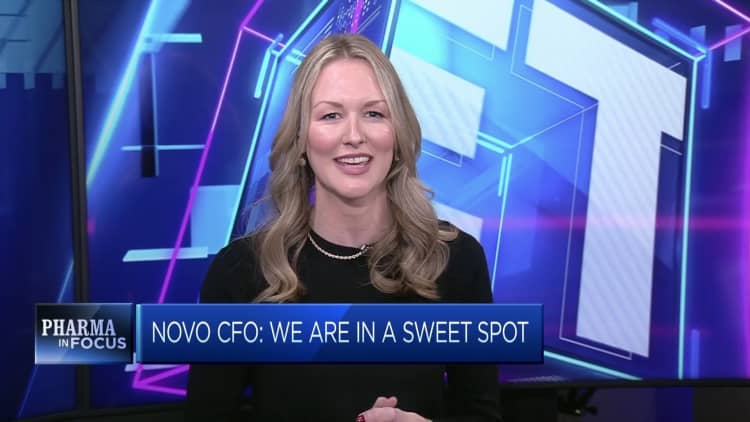Novo Nordisk's weight-loss drug Wegovy has seen its popularity skyrocket.
norphoto | Getty Images
LONDON — The meteoric rise of weight-loss drugs like Wegovy and Mounjaro is generating a host of new product lines as companies hope to land on the right side of the healthcare disruption.
Industries spanning from food and beverage to retail and fitness are in the spotlight amid growing demand for so-called miracle drugs produced by Novo Nordisk and Eli Lilly over fears they could dramatically change consumer habits.
However, some companies say they are seizing the new market opportunity.
Dutch bioscience company DSM Firmenich told CNBC on Wednesday that it is exploring nutritional supplements to complement and offset some of the effects of weight-loss drugs, with CEO Dimitri de Vries calling it a natural progression for the industry.
“If you go into weight loss and you succeed, you move to the health, nutrition and lifestyle counter, because you basically want to continue what you have. That's where we come into play,” De Vries told CNBC's “Squawk Box Europe.” “
Weight loss injections, which rely on a group of medications called GLP-1 (glucagon-like peptide 1) receptor agonists, which work by mimicking a naturally occurring gut hormone that helps regulate appetite in the brain.
Studies are still ongoing on some additional health applications—and potential side effects—of appetite-suppressant drugs. But de Vries said his company is also looking at products to boost muscle retention and protein intake.
“There are some side effects to weight loss medications that mean it's harder to build muscle, and it's harder to maintain your protein level. That's where we come into play. We use ingredients, and we develop ingredients where that's kind of a 'compensation,'” he said.
Novo Nordisk and Eli Lilly did not immediately respond to CNBC's request for comment on the comments.
Consumer goods for airlines
DSM isn't the only company looking to capitalize on the growing market for weight-loss drugs.
Swiss food giant Nestlé announced last month that it would launch a new range of frozen foods targeting users of GLP-1 medications. The Vital Pursuits range, which will initially contain 12 items including whole grain bowls and pizza, is designed to serve as a nutritional “companion” to the medications, the company said.
While weight-loss drugs are changing consumer behaviors, “dietary needs are not going away,” CEO Mark Schneider told CNBC last week.
GLP-1 drugs “will definitely be an interesting addition to all the other needs we're trying to meet in the food industry,” Schneider said.
Antoine de Saint-Affric, Danone's CEO, also told CNBC in April that he sees GLP-1s as “complementary” to the French food company, adding that they will only increase demand for its food products.


However, it is not yet certain whether weight-loss drugs will make consumers more or less likely to reach out for healthier products, according to Barclays analysts.
“Increasing adoption of GLP-1 drugs could be considered as an alternative to food product categories more aligned with health and wellness,” analyst Andrew Lazar said in a research note last year.
“However, consumers can also eat more foods that help with weight management, as they strive to eat healthier and replace these products with more enjoyable snack alternatives,” he added.
The bank's analysts added that such shifts could have similar impacts on restaurants, food retailers and delivery companies that are “moving proactively” to adopt drugs. She cited fast food companies, including Yum Brands and KFC's Shake Shack, as potential beneficiaries if consumers view the drugs as “offsetting” such indulgences.
Airlines can also benefit greatly from mobile passengers as they become increasingly concerned with reducing jet fuel costs. Jefferies analyst Sheila Kahyoglu said in a September note cited by Bloomberg United Airlines It would save $80 million annually if the average rider's weight dropped by 10 pounds.
Even drug packagers could see gains, with companies like Germany's Gerresheimer seeing a potential 2-4% revenue boost from the $100 billion weight-loss drug industry, Barclays said.
Growing weight loss drug competition
It's not yet clear whether such add-on products can replicate the meteoric rise of weight-loss drug companies like Novo Nordisk and Eli Lilly.
“We believe it is too early for investors to take specific positions outside of healthcare stocks on the impact of GLP-1 drugs, and the range of possible scenarios is too broad,” Barclays analysts wrote.


Asked whether the growing demand for food products was reflected in his company's share price, De Vries admitted that it was “too early” to say.
“It's something you need to build over time. It's in the making. But the minute that changes, you'll see that reversed,” he said.
The new products come at a time when other drug companies are playing catch-up to Novo and Eli in an attempt to claim a piece of the weight loss pie.
In China, a major market for the drug, about 15 generic versions of Ozempic and Wegovy are currently being developed, according to clinical trial records cited by Reuters on Thursday.
Meanwhile, some analysts have also expressed caution about the continued rise in the weight-loss drug market itself.
“We don’t necessarily think that ‘miracle’ drugs will be miracle drugs forever,” Guillaume Minuit, head of investment strategy and economics for EMEA at Citi Wealth, told CNBC on Thursday.
